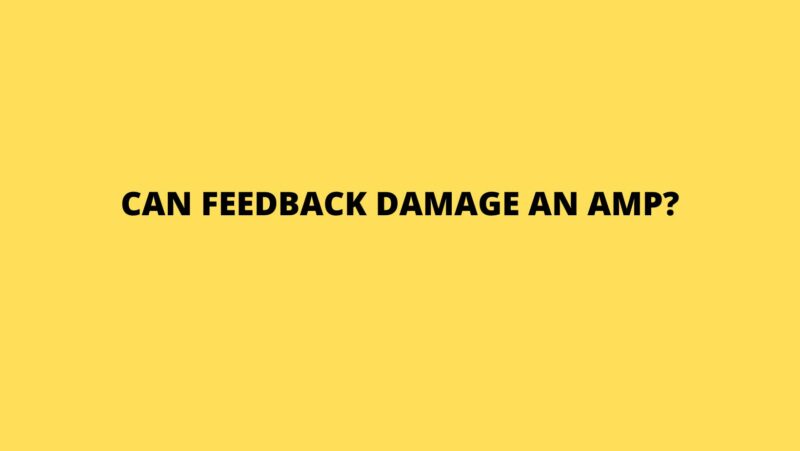Amplifiers are the backbone of modern music, faithfully translating the nuances of instruments into powerful sonic experiences. However, the relationship between amplifiers and feedback can sometimes be precarious. Feedback, that dreaded howling sound resulting from the interaction between sound waves and amplification, is a common concern for musicians and audio enthusiasts alike. But does feedback pose more than just an auditory annoyance? Can it actually damage your amplifier? In this article, we delve into the science behind feedback and its potential impact on amplifiers, shedding light on the extent of the danger it poses.
Feedback 101: The Culprit
Feedback occurs when sound produced by the amplifier’s speakers is picked up by the instrument or microphone and then re-amplified, creating a self-sustaining loop that can magnify specific frequencies to distortion levels. It’s an intricate dance between resonance and amplification, often characterized by an unsettling howl or screech.
The Mechanism of Amplifiers
To understand the potential impact of feedback on amplifiers, it’s essential to grasp how amplifiers function. An amplifier takes an input signal (your instrument’s sound) and boosts its power to produce an output that’s loud enough to fill a room or venue. This amplified signal passes through various components like transistors, tubes, capacitors, and resistors, ultimately reaching the speakers and generating sound.
Feedback’s Effects on Amplifiers
While feedback itself is more of an issue for the quality of sound produced, it can indirectly lead to problems that might damage your amplifier over time. Here are a few potential ways feedback could affect your amplifier:
- Overloading Components: If certain frequencies get looped and amplified through the feedback process, they can overload specific components of your amplifier, such as tubes or transistors. This continuous stress on components can potentially lead to premature wear and tear.
- Heat Buildup: Amplifiers generate heat during operation, and excessive feedback can increase the load on the amplifier’s components. This heightened workload could potentially contribute to higher temperatures within the amplifier, accelerating the aging process of internal parts.
- Speaker Strain: Prolonged exposure to feedback can strain your amplifier’s speakers. Certain frequencies can cause the speaker cone to vibrate excessively, potentially leading to wear and distortion in the long run.
- Distortion and Clipping: Feedback-induced distortion and clipping, while not directly damaging, can make your amplifier work harder to produce a desired sound. This prolonged stress can contribute to faster component degradation.
Preventing Amplifier Damage from Feedback
- Addressing Feedback at the Source: The best way to prevent potential amplifier damage from feedback is to address the feedback issue itself. Utilize strategies like careful amplifier and instrument positioning, microphone techniques, EQ adjustments, and sound checks to control and manage feedback before it becomes problematic.
- Implementing Limiting and Protection: Some modern amplifiers come equipped with protective features like limiters and built-in feedback suppression mechanisms. These tools can help mitigate the risk of amplifier damage by automatically controlling levels when feedback becomes excessive.
- Regular Maintenance: Regular maintenance of your amplifier is crucial to ensure its longevity. Regularly inspect and clean components, and if you suspect any issues arising from feedback, consider seeking professional assistance to diagnose and address potential damage.
Conclusion
Feedback, in and of itself, is not typically a direct amplifier killer. However, the continuous stress placed on components, increased temperatures, and potential wear and tear resulting from prolonged exposure to feedback can indirectly contribute to amplifier problems over time. Prevention is key: by addressing feedback at its source through various strategies and utilizing protective features if available, you can significantly reduce the risk of amplifier damage. Regular maintenance and care for your amplifier will also play a role in ensuring its health and performance over the long haul. Remember, while feedback can be managed and its impact mitigated, taking proactive measures is essential to ensure that your amplifier continues to faithfully translate your musical expression without falling victim to the sonic perils of excessive feedback.


